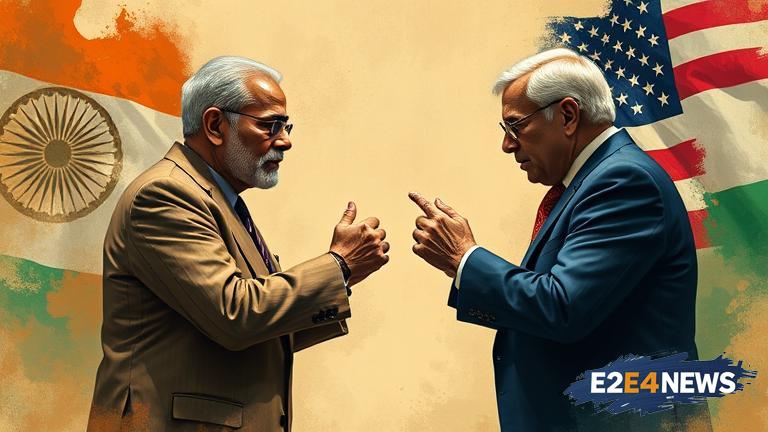India’s diplomatic relations with the US have been a subject of interest for many years, with the country’s actions often being perceived as contradictory. On the surface, India appears to be a strong ally of the US, with the two countries engaging in various diplomatic and economic endeavors. However, beneath the surface, India has been playing a double game, using its relations with the US to further its own interests. This has been evident in India’s actions in recent years, where it has been seen to be cozying up to the US while also maintaining strong ties with other countries, including those that are rivals of the US. One of the primary reasons for India’s double game is its desire to become a major player in global politics. By maintaining good relations with the US, India is able to gain access to advanced technology and military equipment, which it can use to strengthen its own military capabilities. At the same time, India is also aware that it cannot rely solely on the US for its security needs, and therefore maintains strong ties with other countries, including Russia and China. This has allowed India to maintain a delicate balance in its relations with the US, where it is able to reap the benefits of its alliance with the US while also maintaining its independence. However, this double game has not gone unnoticed, and many experts have criticized India’s actions as being deceptive and dishonest. Despite this, India continues to play its double game, using its diplomatic relations with the US to further its own interests. In recent years, India has been seen to be increasingly assertive in its foreign policy, with the country taking a more prominent role in regional and global affairs. This has been evident in India’s actions in the Indo-Pacific region, where it has been working to counter the growing influence of China. At the same time, India has also been strengthening its ties with other countries in the region, including Japan and Australia, in an effort to create a counterbalance to China’s growing power. Despite its growing assertiveness, India’s double game continues to be a subject of controversy, with many experts questioning the country’s true intentions. Some have argued that India’s actions are driven by a desire to become a major player in global politics, while others have suggested that the country is simply trying to protect its own interests. Regardless of the motivations behind India’s actions, it is clear that the country’s double game has significant implications for the US and other countries. As India continues to play its double game, it is likely that the country’s relations with the US will become increasingly complex and nuanced. This could have significant implications for the US, which may find itself having to navigate a complex web of alliances and rivalries in order to achieve its own foreign policy goals. In conclusion, India’s double game with the US is a complex and multifaceted issue, with significant implications for the US and other countries. As India continues to play its double game, it is likely that the country’s relations with the US will become increasingly complex and nuanced, with significant implications for global politics. The US will need to be careful in its dealings with India, as the country’s actions are often driven by a desire to further its own interests. At the same time, the US will also need to be aware of the potential benefits of its alliance with India, including the country’s growing military capabilities and its strategic location in the Indo-Pacific region. As the US navigates its complex relationship with India, it will need to be careful to balance its own interests with the need to maintain good relations with the country. This will require a delicate balance of diplomacy and strategic thinking, as the US seeks to achieve its own foreign policy goals while also navigating the complex web of alliances and rivalries in the region. India’s double game is a significant challenge for the US, but it also presents opportunities for cooperation and collaboration. As the US and India continue to navigate their complex relationship, it is likely that the country’s double game will remain a major issue in global politics. The US will need to be careful and strategic in its dealings with India, as the country’s actions are often driven by a desire to further its own interests. However, with careful diplomacy and strategic thinking, the US may be able to navigate the complex web of alliances and rivalries in the region and achieve its own foreign policy goals. India’s double game is a complex and multifaceted issue, but it also presents opportunities for cooperation and collaboration. As the US and India continue to navigate their complex relationship, it is likely that the country’s double game will remain a major issue in global politics. The implications of India’s double game are far-reaching and complex, with significant implications for the US and other countries. As India continues to play its double game, it is likely that the country’s relations with the US will become increasingly complex and nuanced, with significant implications for global politics. The US will need to be careful and strategic in its dealings with India, as the country’s actions are often driven by a desire to further its own interests. However, with careful diplomacy and strategic thinking, the US may be able to navigate the complex web of alliances and rivalries in the region and achieve its own foreign policy goals. In the end, India’s double game is a significant challenge for the US, but it also presents opportunities for cooperation and collaboration. As the US and India continue to navigate their complex relationship, it is likely that the country’s double game will remain a major issue in global politics.





